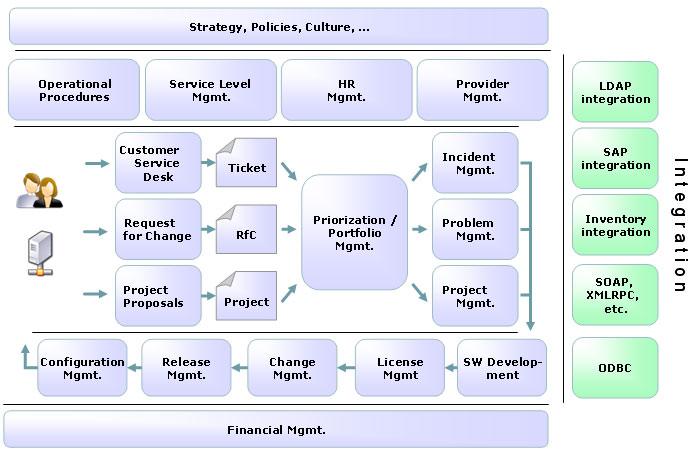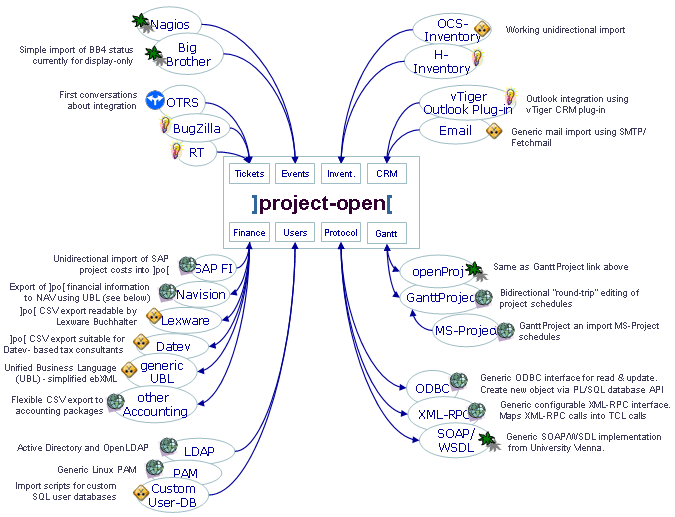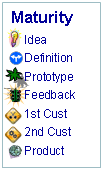]project-open[ ITSM Processes
The following diagram provides an overview over the processes supported by
 |
ITSM processes supported by ]project-open[ |
ITSM Challenges
IT departments face various challenges such as cost reduction, regulatory compliance, competitiveness of internal IT compared to outsourced services andapplication and infrastructure modernization. Management's demands to better control IT processes, more demanding end users and shorter innovation cycles lead to higher requirements in terms of flexibility and responsiveness.
IT Service Management ITIL, COBIT, etc.
Organizations approach this challenges by adapting industry best practices. Initiatives usually depend on operational needs, strategic alignment, access to know-how and tools available in the marketplace. If an organization is following the common and popular ITIL standards or deploying other framworks such as COBIT, the objectives usually remain the same: Maximizing the benefits derived from the use of information technology and developing appropriate IT governance and control in a company.
Our value proposition
- Integration
We provide a one-stop solution for IT management integrating important applications and replacing 10-15 smaller ones. Just like the ERP systems did to manufacturing companies 20 years ago. - Visibility & Transparency
We allow business managers and business users to monitor IT projects and IT service operations. - Financials & Controlling
We introduce a solid financial perspective across all IT activities, with low overhead for employees. - Business Intelligence
We provide managers with indicators, reports and other analysis tools to build an integrated ITSM scorecard.
Benefits of following the open-source way in ITSM
Most companies nowadays have embraced the benefits of using Open-Source Software / Free Software (OSS/FS) like lower costs of ownership (TCO), scalability, control and flexibility advantages, no license management costs and lower upgrade/maintenance costs - just to name a few. OSS/FS protects its users from the risks and disadvantages of single source solutions. Most importantly as a user you don't need to rely on the vendor's agenda and instead of having a single point of reference, a network of internal and external IT service providers is at your disposal.
]project-open[ ITSM Benefits
- One Integrated Application:
]po[ can replace a large number of stand-alone applications with a single integrated system, reducing the maintenance overhead and the number of providers. - Regulatory Compliance:
The]po[ integration of Change Management with Configuration Management provides a "transparent" change management history of released software as required by auditing organizations in the financial sector. - Increased Visibility of IT Projects:
]po[ allows project stakeholders to check the project status. Permissions determine whether a user can read, modify or administer a project. - Project Budget & Progress Tracking:
]po[ shows up to date information about budget and progress for each project. Information includes timesheet information, external costs such as travel costs and information imported from SAP FI or other accounting applications. - IT Service Cost & Financial Controlling:
]po[ automatically captures all necessary information in order to determine IT costs for service types. - Performance Reports and Statistics:
The integrated reporting and data-warehouse engines provide insight into key process indicators. - Project Portfolio Management:
PPM allows managing lists of projects and development requests and supports senior management decision-making by providing all fields necessary to priorize requests. - Release Management:
]po[ can manage and track the advance of different items included in a software release, allowing the release manager to take informed decisions. - Learned Lessons, Wiki, Blog & Knowledge Management:
A full text search engine indexes all contents in]po[ , allowing fast access to learned lessons, wiki pages and solutions to previous bugs, what is sometimes resulting in enormous time savings.
]project-open[ ITSM Integration Links
 |
|
|

Systems Monitoring and Incident Tracking Integration Links
Authentication and Identity Management
Inventory and Configuration Management Integration Links
Project Scheduling
Financial Management Integration Links
Generic Interfaces
|
]project-open[ ITSM Modules in Detail
]po[ ITSM Helpdesk
The
All incidents are registered with the system. Supported by business intelligence capabilities it serves as an extremely beneficial tool for IT Management when used to find, analyze, and eliminate common problems.
Staff members can effectively track and monitor the status of customer problems.
The Help Desk provides to customers a central and convenient point of reference for their IT-related incidents. At any time new incidents can be entered and already registered incidents can be looked up to determine their status.
A powerful and highly configurable workflow engine is used to manage the flow of tickets.
]po[ ITSM Change Management
The objective of Change Management is to ensure that standardized methods and procedures are used for efficient and prompt handling of all changes leading to controlled IT infrastructure, in order to minimize the number and impact of any related incidents upon service.
]po[ ITSM Release Management
Release Management supports the platform-independent and automated distribution of software and hardware, including license controls across the entire IT infrastructure.
]po[ ITSM Configuration Management
Configuration Management is a process within the Information Technology Infrastructure Library (ITIL). It deals with tracking individual Configuration Items (CI) in an IT environment which can be as simple as server or as complex as an entire IT Department. ]project-open[ ITSM supports the five main activities in CM: Planning, Identification, Control, Monitoring and Verification.
]project-open[ Implementation & (Organizational) Change Management
A successful implementation of an application like
To address these issues the
- Operating procedures, processes and workflows,
- existing tools and
- the data contained in existing tools.
Based on this input, we develop several "reasonable" scenarios on how to integrate existing structures into a single consistent system.
- Thanks to its database API, it is easy to import data from external applications into the
]po[ database in order to make them available to]po[ users. - As an alternative, thanks to its modular architecture it is relatively easy to extend
]po[ to cover new processes.
Thanks to its modular architecture and the low overall implementation costs (open-source),

